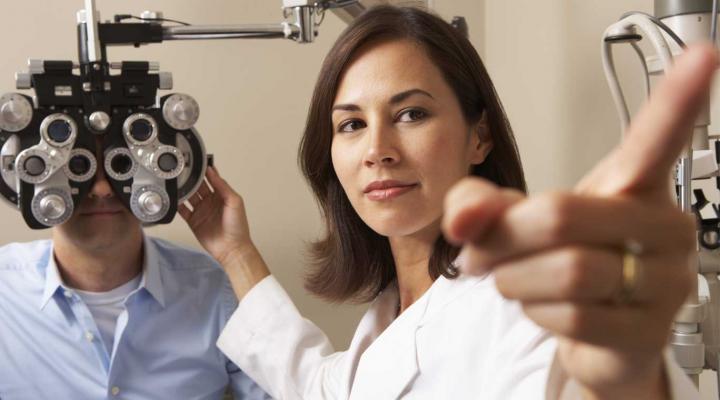
It is a legal requirement that Britons moving to Spain secure appropriate health insurance, but whilst they’re busy finding the right healthcare and doctor for them, many of these same Britons feel to register with an optician to ensure that their eyecare is also taken care of. Many fully comprehensive health insurance plans actually include eye care and access to an optician; this is something that is well worth exploration, particularly if you already wear glasses or contact lenses. But even if you don’t, you never know when an eye problem might occur, and if your insurance doesn’t cover this it could be a very costly appointment to attend!
To help you make the right decision for you, here is our full guide to eyecare in Spain:
Do You Need an English-Speaking Eye Doctor?
If you don’t speak Spanish then you will either need to attend your appointment with a Spanish speaking friend, who can act as a translator for you, or you need to seek out an English-speaking optician. The prevalence of English-speaking eye care professionals will depend on where you live (and how many other ex-pats live there too). In areas where many ex-pats choose to live, such as the Costa del Sol, it should be relatively easy to find an English-speaking eye doctor.
Do I Need To Make an Appointment?
Unlike in the UK, where you usually need to make an appointment weeks in advance to visit your optician, in Spain the process is much faster and easier. Appointments in advance are rarely required: you can just walk in and ask for an eye exam, and you will be seen on the same day. You also won’t have to pay for your eye exam: all Spanish optical retailers will offer you this for free. However, you should be aware that, with the free eye exam, comes the obligation that you then buy your glasses or lenses from them if you need them. For this reason, it is worth checking out the prices of the glasses available before you commit to the appointment.
Where Will I Find an Optician?
Opticians usually have stores on your local high street, and you will find at least one in every Spanish town centre. If you want to be sure you know where you’re going before you leave the house then use google (or your preferred search engine) to look for “ópticas en España”
What Happens at a Spanish Eye Test
The eye test in Spain is identical to the one you would receive anywhere else in the world: you read letters, numbers, and colours when you’re asked to. It is worth making it clear to your optician before the test begins whether you will be conducting the test in English or Spanish, so that nothing is lost in translation, and there is no confusion about the pronunciation of certain similar words.
Securing Private Insurance for Your Eye Care
If you already have a health insurance policy that you’re happy with that doesn’t cover eye care, you might want to consider buying a separate eye care policy. It may also be cheaper to simply switch to a new policy that includes eye care as standard. Companies such as Allianz Care, Cigna Global and Globality Health all have a good reputation amongst the expat community.
What if I need to See an Eye Specialist?
Some eye treatments are available for free via the state-run healthcare system, and you will be entitled to this healthcare if you work in Spain, and pay contributions to this system through your tax payments. However, if you’re retired or living in Spain via a visa that does not permit you to work then it is likely that you will either pay for your own specialist eye care or that it will be covered by your insurance.
You are likely to be referred to a specialist if you need eye surgery, cataract tests, or even prescription drugs to improve an eye infection. This referral will usually be made by your GP. How long the referral will take (and how much you’ll pay) will depend on factors such as the severity of your eye condition, whether you have a private health insurance plan, and who that plan is with.
Not all eye clinics in Spain accept private health insurance policies, so always check before booking any appointments or procedures. You should also be aware that you may need to pay everything upfront before being reimbursed by your insurance company, which means you may need to have access to a significant sum prior to your appointment.
Wearing Glasses and Contact Lenses in Spain
As mentioned above, the eye test that you receive at your opticians is free, and the prescription is free too. But many optical stores won’t just give you your prescription, as they don’t want you to buy glasses from a competitor, or online, at a lower cost. If you don’t need a new prescription or an updated eye test though, you can just take your current prescription to a Spanish optician, and use this to buy new glasses or order new contact lenses.
Are Glasses in Spain Expensive?
Finally, you will be pleased to know that if you do discover you need to wear glasses whilst you’re living in Spain, the cost of eyewear is relatively affordable. Expect to pay €49 for basic frames up to €200 for designer frames: the price of designer frames in Spain is up to half the cost that you would pay in countries such as the UK or USA. If you prefer to wear contact lenses then you will expect to pay around 80 euros for a six-month supply, and both your glasses and your contact lenses can be ready for you in between 2 days to 2 weeks, depending on the type and the optician you choose.
If you’re looking to save a little more money, visit your local supermarket or smaller retailers such as Tiger where you can find budget non-prescription reading glasses from as little as €4. Meaning that looking after your eyes in Spain can be much easier, and much more affordable, than you might think.
Always dreamt of moving to Spain? There has never been a better time to turn your dream of Spanish home ownership into a reality. If you’re looking for estate agents in Southern Spain then why not get in touch ? Our locally based property experts are a font of local knowledge, and are perfectly placed to help you find the home of your dreams.

 English
English Español
Español Deutsch
Deutsch Français
Français Svenska
Svenska Nederlands
Nederlands Italiano
Italiano Norsk
Norsk Русский
Русский

































